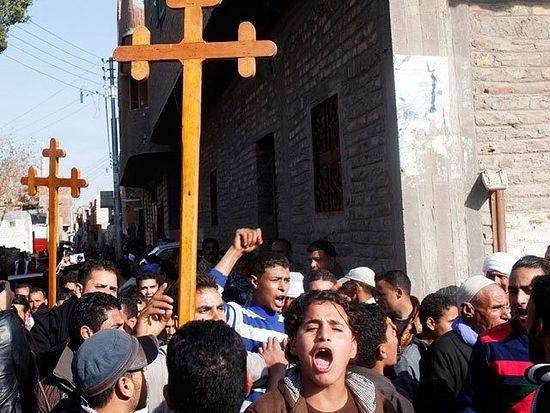Egyptian Court Sentences Three Christian Teens to Prison for ‘Insulting Islam’
 “They have been sentenced for contempt of Islam and inciting sectarian strife,” explained defense lawyer Maher Naguib. “The judge didn’t show any mercy. He handed down the maximum punishment.”
“They have been sentenced for contempt of Islam and inciting sectarian strife,” explained defense lawyer Maher Naguib. “The judge didn’t show any mercy. He handed down the maximum punishment.”
Blasphemy laws still exist in Egypt. Article 98 describes the punishment:
Confinement for a period of not less than six months and not exceeding five years, or a fine of not less than five hundred pounds and not exceeding one thousands pounds shall be the penalty inflicted on whoever make use of religion in propagating, either by words, in writing, or in any other means, extreme ideas for the purpose of inciting strife, ridiculing or insulting a heavenly religion or a sect following it, or damaging national unity.
Naguib said the teens meant to “mock the beheadings carried out by ISIS (Islamic State) militants.”
The three boys sentenced to jail were between 15 and 17 years old when they shot the video. The judge sentenced a fourth boy, 15, to serve time in a juvenile detention center.
Their neighbors discovered the footage and handed it over to the police. Coptic Christians condemned the arrests.
“They are some kids who decided to have fun in a private place,” stated Mina Thabet, a Coptic activist and researcher at the Egyptian Commission for Rights and Freedoms. “They were on a trip with their teacher, but somehow rumor got out that they’d thrown down the Koran, and had insulted Islam, so that led to their arrests.”
The police had arrested the Coptic teacher and held him for four days, but the mob nonetheless demanded more punishment, descending upon the children’s homes and “[throwing] rocks at the homes of the youth in a bid to force their parents” to surrender the kids.
“The case of the five arrested in Minya and charged with blasphemy represents yet another case of how Egypt continues to bend to the weight of extremist ideology,” said Todd Daniels, the Middle East regional manager for International Christian Concern:
A video – not even shared publicly – that mocked ISIS, a group that openly beheaded twenty Egyptian citizens, has already put these five in prison and may lead to lengthy prison sentences. Despite progress in terms of rhetoric from [Egyptian] President [Abdel Fattah el-Sisi], Egypt has pervasive persecution that continues to occur not only on the societal level but also in the judiciary.
In 2014, Egyptian President Abdel Fattah al-Sisi became the first leader to attend Christmas Eve Mass. He attended the service at St. Mark’s Cathedral in Cairo.
“It’s important for the world to see this scene, which reflects true Egyptian unity, and to confirm that we’re all Egyptians, first and foremost,” he claimed at the time. “We truly love each other without discrimination, because this is the Egyptian truth.”
He also attended Mass last month, where he pledged to rebuild churches destroyed by the Muslim Brotherhood in 2013 after the military ousted President Mohamed Morsi.
In December, leaders of Egypt’s Coptic community attended a UN minority rights forum in Geneva, where they condemned the country’s blasphemy law. Medhat Kelada, head of the European Coptic Organizations Union, insists the law “badly exploited against the Copts.”
Leaders, nonetheless, praised Sisi for protecting them from the Muslim Brotherhood. Coptic Orthodox Pope Tawadros considers the president a “hero.” Some insist, however, that the government will not completely change. “Sisi is conservative. He doesn’t care about religious freedom,” said Thabet.
Source: Pravoslavie.ru

